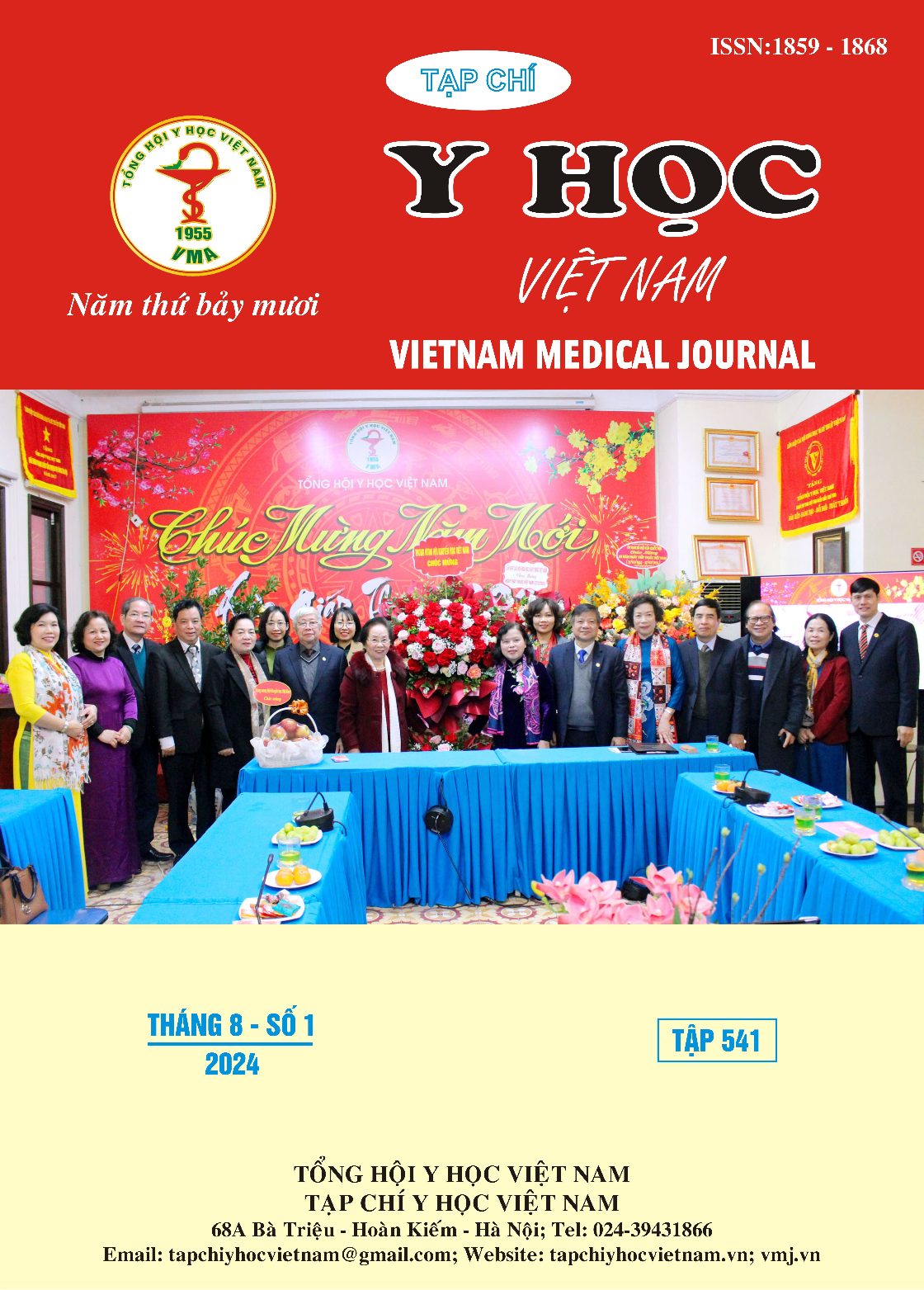NGHIÊN CỨU TẦN SUẤT VÀ MỐI LIÊN QUAN GIỮA ĐA HÌNH ĐƠN NUCLEOTID RS1042522 VỚI MỘT SỐ CHỈ SỐ TRÊN BỆNH NHÂN ĐÁI THÁO ĐƯỜNG TÝP 2
Nội dung chính của bài viết
Tóm tắt
Đặt vấn đề: Các nghiên cứu chỉ ra vai trò của các yếu tố di truyền đối với nguy cơ mắc bệnh đái tháo đường. Do đó, nghiên cứu này nhằm mục tiêu khảo sát tần suất của đa hình đơn nucleotid rs1042522 trên gen p53 và mối liên quan của nó với nguy cơ mắc bệnh đái tháo đường týp 2. Đối tượng và phương pháp: Nghiên cứu tiến hành theo phương pháp mô tả cắt ngang, bao gồm 91 người khoẻ mạnh và 180 bệnh nhân đái tháo đường týp 2. Phương pháp PCR đặc hiệu alen được sử dụng để phân tích kiểu gen. Số liệu được phân tích trên GraphPrism 8.4. Kết quả: Tỉ lệ phân bố kiểu gen GG, GC và CC của rs1042522 trong nhóm nghiên cứu tương ứng là 24,72%, 50,55% và 24,72%. Không phát hiện sự khác biệt về các chỉ số glucose máu, HbA1c, Insulin và HOMA-IR giữa các kiểu gen (p>0,05). Phân tích theo mô hình lặn, kiểu gen rs1042522 liên quan đến nguy cơ xuất hiện bệnh đái tháo đường típ 2 với OR=2,058; 95% CI=1,096 - 3,822; p=0,0261. Kết luận: Tỉ lệ của các kiểu gen GG, GC và CC của rs1042522 trên gen p53 trong nhóm nghiên cứu tương ứng là 24,72%, 50,55% và 24,72%. Kiểu gen của điểm đa hình rs1042522 liên quan đến nguy cơ xuất hiện bệnh nhân đái tháo đường típ 2 theo mô hình lặn.
Chi tiết bài viết
Từ khóa
Đái tháo đường, rs1042522, p53.
Tài liệu tham khảo
2. Asadi M, Shanehbandi D, Zarintan A, Pedram N, Baradaran B, Zafari V, Shirmohamadi M, Hashemzadeh S: TP53 Gene Pro72Arg (rs1042522) Single Nucleotide Polymorphism as Not a Risk Factor for Colorectal Cancer in the Iranian Azari Population. Asian Pac J Cancer Prev 2017, 18(12):3423-3427.
3. Burgdorf KS, Grarup N, Justesen JM, Harder MN, Witte DR, Jorgensen T, Sandbaek A, Lauritzen T, Madsbad S, Hansen T et al: Studies of the association of Arg72Pro of tumor suppressor protein p53 with type 2 diabetes in a combined analysis of 55,521 Europeans. PLoS One 2011, 6(1):e15813.
4. Doffe F, Carbonnier V, Tissier M, Leroy B, Martins I, Mattsson JSM, Micke P, Pavlova S, Pospisilova S, Smardova J et al: Identification and functional characterization of new missense SNPs in the coding region of the TP53 gene. Cell Death Differ 2021, 28(5):1477-1492.
5. Guo D, Fang L, Yu X, Wang C, Wang Y, Guo W: Different Roles of TP53 Codon 72 Polymorphism in Type 2 Diabetes and Its Complications: Evidence from a Case-Control Study on a Chinese Han Population. Int J Gen Med 2021, 14:4259-4268.
6. Slominski B, Skrzypkowska M, Ryba-Stanislawowska M, Mysliwiec M, Trzonkowski P: Associations of TP53 codon 72 polymorphism with complications and comorbidities in patients with type 1 diabetes. J Mol Med (Berl) 2021, 99(5):675-683.
7. Toyama T, Zhang Z, Nishio M, Hamaguchi M, Kondo N, Iwase H, Iwata H, Takahashi S, Yamashita H, Fujii Y: Association of TP53 codon 72 polymorphism and the outcome of adjuvant therapy in breast cancer patients. Breast Cancer Res 2007, 9(3):R34.
8. Yu M, Zhang Q, Zhao X: Associations of MDM2 rs2279744 and TP53 rs1042522 polymorphisms with cervical cancer risk: A meta-analysis and systematic review. Front Oncol 2022, 12:973077.


